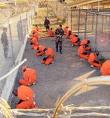VIDEO: “Guidebook to False Confessions”: Key Document John Yoo Used to Draft Torture Memo Released

“Guidebook to False Confessions”:
Key Document John Yoo Used to Draft Torture Memo Released
By Jason Leopold and Jeffrey Kaye
truth-out.org
 In May of 2002, one of several meetings was convened at the White House where the CIA sought permission from top Bush administration officials, including then National Security Adviser Condoleezza Rice, to torture the agency’s first high-value detainee captured after 9/11: Abu Zubaydah.
In May of 2002, one of several meetings was convened at the White House where the CIA sought permission from top Bush administration officials, including then National Security Adviser Condoleezza Rice, to torture the agency’s first high-value detainee captured after 9/11: Abu Zubaydah.
The CIA claimed Zubaydah, who at the time was being held at a black site prison in Thailand, was “withholding imminent threat information during the initial interrogation sessions,” according to documents released by the Senate Intelligence Committee in April 2009.
So “attorneys from the CIA’s Office of General Counsel [including the agency’s top lawyer John Rizzo] met with the Attorney General [John Ashcroft], the National Security Adviser [Rice], the Deputy National Security Adviser [Stephen Hadley], the Legal Adviser to the National Security Council [John Bellinger], and the Counsel to the President [Alberto Gonzales] in mid-May 2002 to discuss the possible use of alternative interrogation methods that differed from the traditional methods used by the U.S.”
One of the key documents handed out to Bush officials at this meeting, and at Principals Committee sessions chaired by Rice that took place between May and July 2002, was a 37-page instructional manual that contained detailed descriptions of seven of the ten techniques that ended up in the legal opinion widely referred to as the “torture memo,” drafted by Justice Department Office of Legal Counsel (OLC) attorney John Yoo and signed by his boss, Jay Bybee, three months later. According to Rice, Yoo had attended the Principals Committee meetings and participated in discussions about Zubaydah’s torture.
That instructional manual, referred to as “Pre-Academic Laboratory (PREAL) OPERATING INSTRUCTIONS,” has just been released by the Department of Defense under the Freedom of Information Act (FOIA). The document sheds additional light on the origins of the Bush administration’s torture policy and, to date, is the earliest piece of evidence the government has released that describes the specific torture methods top Bush officials discussed – and subsequently approved – for Zubaydah less than two months after he was captured…
Guidebook to False Confessions
(…) Air Force Col. Steven Kleinman, a career military intelligence officer recognized as one of the DOD’s most effective interrogators as well a former SERE instructor and director of intelligence for JPRA’s teaching academy, said he immediately knew the true value of the PREAL manual if employed as part of an interrogation program.
“This is the guidebook to getting false confessions, a system drawn specifically from the communist interrogation model that was used to generate propaganda rather than intelligence,” Kleinman said in an interview. “If your goal is to obtain useful and reliable information this is not the source book you should be using.”
Read the entire article here

